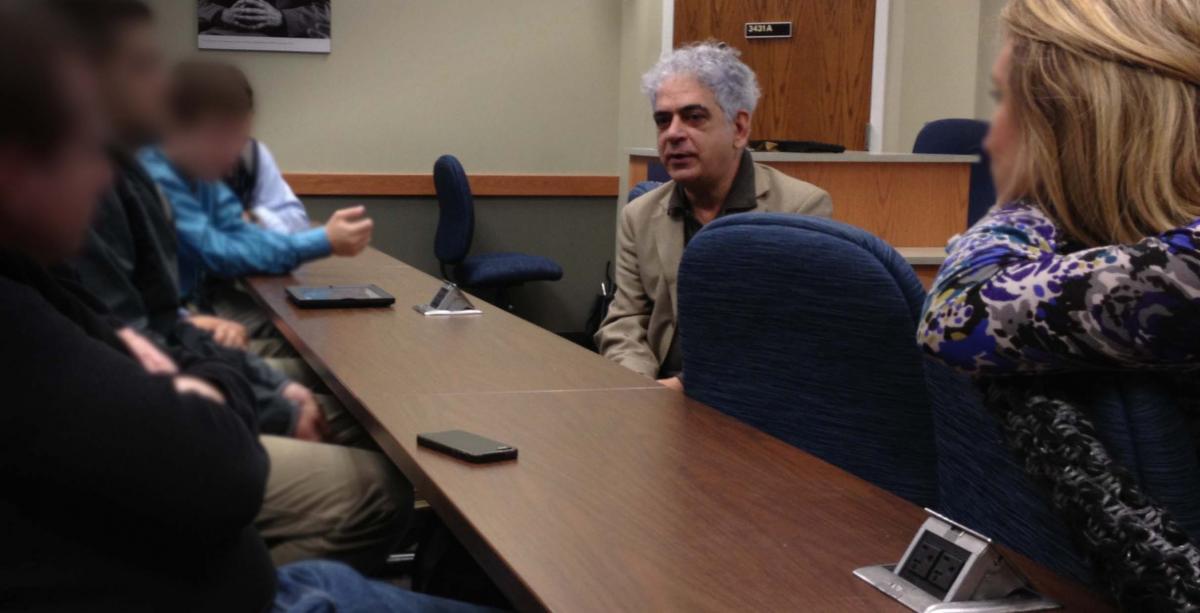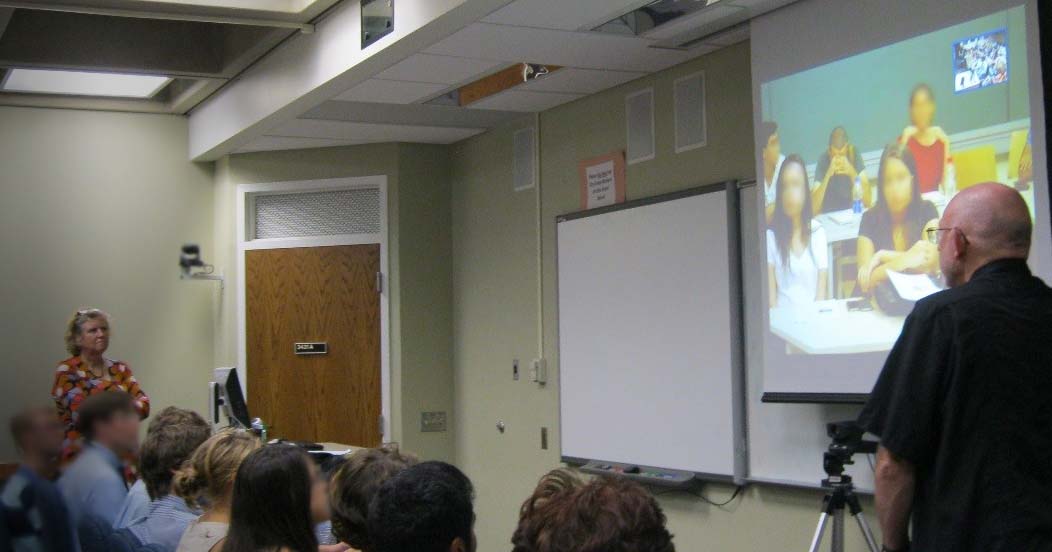GSC Faculty Promote Innovative Teaching Methods Using Technology
By Clare Connors
In fall 2013, the GSC sponsored a series of three “Egyptian Dialogues” between global studies students and University of Pittsburgh community members and students at the American University in Cairo (AUC). The “Egyptian Dialogues,” a GSC and Consortium of Educational Resources on Islamic Studies (CERIS) collaboration, used live streaming video technology to create one large and energetic “class” discussion of critical global issues. It was an experiment focused on developing teaching platforms that support cross-disciplinary and multi-region programs and courses.
The “Dialogues” focused on specific issues of interest to the United States and Egypt and the historical, political, and economic contexts surrounding these issues including “The New Wave of Revolts,” “Globalization and the World Economy: The Impact of the 2009 Global Economic Crisis,” and “The Middle East, Africa and the US: Major Issues, Shared Views, and Diverse Perspectives.” Here in Pittsburgh, each of the three “Dialogues” brought a cohort of Egyptian political science students and their teacher, Dr. Riham Bahi, together with Pitt undergraduate and graduate students, faculty, and staff; students from Central Catholic High School and their teacher; and a diverse group of Pittsburgh-area community members.

The “Dialogues” grew out of one of the central challenges involved in teaching courses like “Introduction to Global Studies,” a required course for Global Studies Certificate students currently taught by GSC faculty, Dr. Roger Rouse. This course inherently raises pedagogical issues such as what innovative teaching methods and approaches need to be developed to teach an interdisciplinary and cross-regional field like global studies; and what role can technology play in taking students out of their immediate local context and placing them in the center of a multi-perspective experience examining some of the world’s biggest global challenges?
In response to this challenge, the “Egyptian Dialogues” series specifically aims to establish long-term productive instructional partnerships and collaborations across disciplines and institutions; create classroom experiences for students based upon multiple, interacting levels and layers of dialogue; and capitalize on the creative use of emergent technologies to establish intellectual communities across time and space.
The connection between Pitt and AUC was first established by GSC Assistant Director for Academic Affairs and Academic Adviser, Elaine Linn, when she and a cohort of high school teachers spent eight weeks traveling and studying in Egypt on a 2009 Fulbright-Hayes grant designed to support teachers developing curricular materials focused on the Middle East. It was through a research project sponsored by the Fulbright-Hayes grant that Ms. Linn and Dr. Bahi first met and the relationship between Pitt and AUC formed.

Dr. Roger Rouse and Ms. Elaine Linn lead the dialogue with the students of Dr. Riham Bahi at the University of Cairo.
Three faculty members from three different academic disciplines, Dr. Roger Rouse, Global Studies (Pitt); Dr. Mohammed Bamyeh, Department of Sociology (Pitt); and Dr. Riham Bahi, Department of Political Science (AUC); worked together as a team to develop the themes and reading materials for each of the three “Dialogues.” Links to digital copies of all texts for each of the three “Dialogues” are available on the CERIS website, here.
As Dr. Roger Rouse explains, the faculty sought to shape the “Egyptian Dialogues” as a multi-dimensional intellectual experience for participants consisting of multiple, interacting levels of dialogue. The faculty provided students with challenging texts they would not ordinarily encounter, including classic and non-mainstream publications from a diverse set of cultural and historical perspectives on the issues. The event’s structure promoted a dialogue between texts; a dialogue between students from both classroom communities; a dialogue between faculty and students; and a dialogue between students and other participants who had joined the classes for the “Dialogues.”
The use of live streaming technology made the “Dialogues” possible, but not without challenges. Setting up each of the classrooms so that all participants were visible and audible took time and experimentation over the three sessions. But in the end, as explained by Ms. Linn, “We had a real conversation just like we would have on the streets of Cairo.”
Click here to see other Spring 2014 GSC Newsletter content
